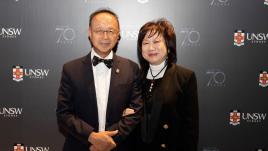Providing the best home school environment for your gifted child
Expert advice for those finding it hard to juggle work commitments with the unique educational needs of a gifted child.
Supporting your child or children to learn at home is a significant undertaking for any parent, let alone for those whose children require very specific learning environments and tools. This can also become particularly complex while also trying to juggle work commitments.
Associate Professor Jae Yup Jared Jung at UNSW School of Education, who is also the Director of GERRIC, says that while home-based schooling during COVID-19 does come with its challenges, it is still possible to support your gifted child to get a strong educational experience. Below he shares his three tips on how to provide a stimulating home school environment, and where to seek further support if you need it.
Personalise the classroom to your child
There are many positives to home schooling, which is why many parents of gifted children actually choose to teach them at home. Unlike in traditional classrooms, "home schooling allows you to personalise instruction to the specific individual needs of a child," says Associate Professor Jung.
Many gifted students become bored, unchallenged, start marking time and switch off in the regular classroom because their teacher is unable to tailor their teaching and educational materials to the needs of gifted students. To prevent this from happening at home, it may be useful to split class time between completing allocated schoolwork and providing educational opportunities that will help your child get what they need.
"Gifted children often enjoy working independently with some guidance and measures set by the parent," says Associate Professor Jung. "Get them involved in an online research project in an area of their interest and ability."
As a parent, you can take on the role of project facilitator and come back together at the end of the school day and discuss what your child has learnt and set activities for the following day.
Help your child tap into all their interests and abilities
While it can be easy to focus only on your child's intellectual needs, Associate Professor Jung recommends that you "provide an environment and a range of resources that support the non-intellectual abilities of gifted students as well." Many gifted children have also been found to have increased ability in creative, emotional, social and physical domains as well.
For example, parents may set their children art projects and daily exercises, encourage them to practise mindfulness and leadership skills, and support their involvement in community activities. Allowing time for the development of varying skillsets will ensure gifted children are given the opportunity to have many of their needs met.
Remember there is help available
Even though you're doing everything you can to support your child at home, it's okay to feel confused about their specific educational needs.
"Many parents recognise that their child isn't a typical child and they invest time and effort to find out about gifted education," says Associate Professor Jung. However, they cannot be expected to be teachers "who have had training and professional development in gifted education."
If you're feeling frustrated and overwhelmed by the level of educational support you can provide due to time and financial constraints, Associate Professor Jung recommends that you attend a workshop or access a variety of online resources that will help you balance your dual parent and teacher role.
If you need further support
- GERRIC runs workshops three to four times a year for parents who want to develop a greater understanding of their gifted child's needs and meet other parents of gifted children who are going through similar situations.
- UNSW School of Education also sends monthly newsletters that include online resources parents can use to help them create a fulfilling teaching environment at home. You can sign up online.
- The Australian Association for the Education of the Gifted and Talented (AAEGT) hosts a range of resources, activities and educational materials on their website for gifted children of all ages and abilities.








